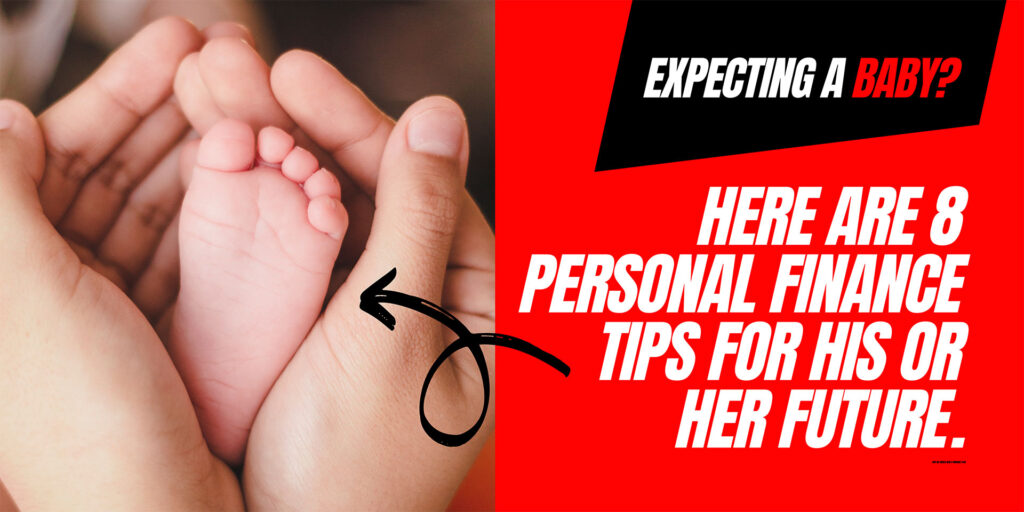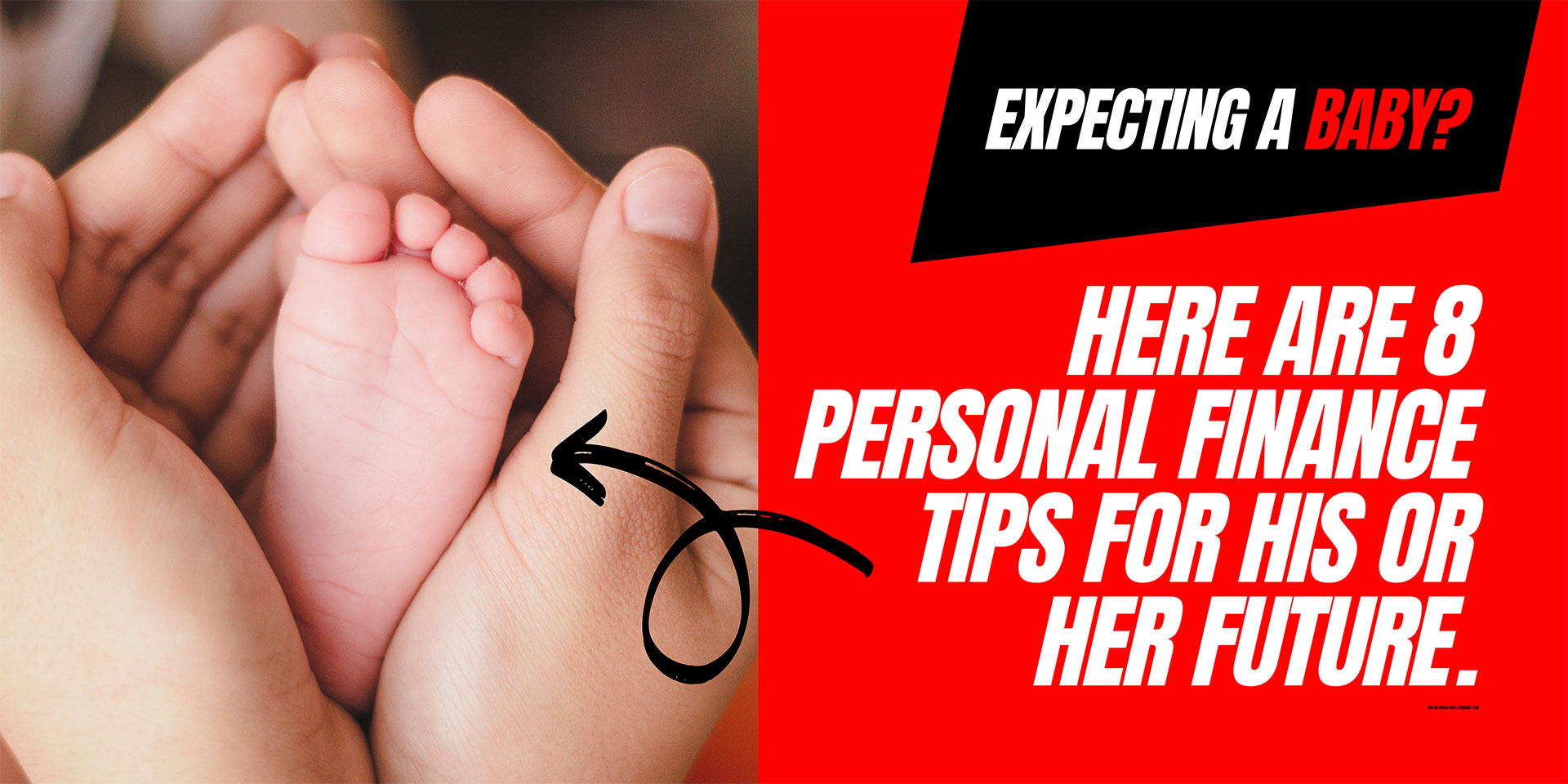
Looking for Personal Finance Tips? A new baby completely transforms your life. You may be experiencing a range of feelings, from excitement and delight to anxiousness and even full-fledged anxiety. If you’ve ever been in bed wondering, “Will I be able to raise a nice child? for newborns. Is this something I’m prepared for? You’re not alone if you’re undecided between purees and baby-led weaning.
The biggest concern on many prospective parents’ minds: “How much money should I have saved before having a baby?”
When you start thinking about having a kid or find out you’re expecting one, you should put your personal finances first. This will assist you in developing excellent habits and maximizing your financial resources. Here are eight personal finance tips recommendations to guarantee that your newborn baby has a bright future.
The first few days, weeks, and months with a new baby in the house are a beautiful whirlwind, so the sooner you set and achieve certain financial objectives, the less you’ll have to worry about when you’re busy changing diapers and getting up for 3:00 a.m. feedings. The checklist below might assist you in getting started.
Table of Contents
Financial Goals To Be Set Before Newborn Arrives.
Be Ready With A Budget For Expenses Following The Arrival Of Newborn
You may be unaware of the cost of newborn expenditures for the first year if you are a first-time parent or if it has been several years since you last had a child. Make sure to include time off from work following the delivery in your budget. If one parent stays at home with the newborn baby, there may be a reduction in income.
Your baby supply budget is mostly determined by your preferences, the demands of your child, the amount of money you have to spend, and the number of presents you’ll get from family and friends. If you’re a first-time parent, you should realize that babies don’t require much to be content. Usually, a clean bottom, a full belly, and lots of cuddling suffice. When deciding how to budget for a baby in your usual budget, keep the following points in mind.
Clothes and toys can be as pricey or as inexpensive as you desire, depending on whether you prefer old or new products. Some of these goods will very certainly be given to you as presents, so hold off on purchasing them until after the baby is born.
Need Day Care? Make Arrangements Ahead Of Time.
Because both parents work, you should begin looking for childcare for your newborn choices right once. If you expect to need child care beyond what your family can supply, you should begin looking into possibilities as soon as you notice a positive pregnancy test or make plans for adoption as soon as possible. Personal finance tips should be taken into consideration too. Daycare centers might quickly fill up or have a long waiting list, so get started as soon as possible is usually a smart idea.
Families that cannot afford the high costs of childcare sometimes use a combination of family and alternative care sources. Grandparents are a common provider of childcare, with the majority of grandparents in India providing babysitting or daycare services. Commercial daycares frequently charge more than home-based care services.
Reduce Debt And Start Saving For An Emergency.
As soon as you know you’re going to have a kid, you should pay off your credit card debt. You should also set aside at least three months’ worth of living costs in an emergency fund. If one of the parents is staying at home with the newborn, an emergency fund of six months’ worth of living expenses is recommended.
It’s hard to anticipate every new expense or unforeseen cost that may arise when you have a newborn, no matter how budget-savvy you are. Extra babysitting services for your newborn when you have to work late, a trip to the ER in the middle of the night, or more pediatrician appointments and prescriptions are all possibilities.
Saving for unanticipated expenses and unexpected events can save you from going into debt or having to borrow money from relatives and friends, which neither of you wants to be in. Set aside 6 to 9 months’ worth of living costs in a separate account. Remember that beginning somewhere is beneficial, so set up automatic transfers to this account and begin saving tiny sums.
Whether you’re trying to pay off a credit card or other debt, make sure you pay at least the minimum sum each billing cycle to prevent damaging your credit. Then calculate how much money you’ll need to support a baby financially. Determine your budget for baby supplies, add the amount needed to cover any maternity or paternity leave, then divide that sum by the number of months before the baby comes, as a basic rule of thumb. Then, to pay off debt quicker, check how much money is left each month.
Costs Of Prenatal Care And Delivery
Pregnancy and delivery care for a typical birth will cost you money, regardless of whether you have a conventional employer-provided health insurance plan or any other sort of insurance. Check with your insurer to determine whether prenatal care and delivery expenditures are covered under their policy so you can budget for them in your personal financial plan.
All coverage, however, is not created equal. Even if you have insurance, prenatal care and childbirth can cost thousands of dollars. On the bright side, several insurance plans cover unexpected expenses like lactation consultant visits.
Check with your health insurance carrier now to gather answers to the following questions:
- What does my policy cover in terms of prenatal care?
- What is the amount of my deductible?
- What is the procedure for applying my deductible?
- Is a hospital or NICU stay of newborn covered by my insurance?
- Does my coverage cover extra hospital providers, such as the on-staff anesthesiologist?
- How can I enroll my newborn in my health-care plan?
- Is chiropractic care, acupuncture, or prenatal massage covered under my plan? Is there anything I need to acquire coverage for these procedures (like a note from my OB-GYN)?
- What are the mental health services that you provide? Could you offer me a list of mental health specialists that take this insurance in my area?
Keep in mind that if your hospital cost is more than you expected, you have the right to request an itemized statement so you can double-check each charge. You can also contest any accusations with which you disagree.
Insurance Review
You should examine your life insurance and disability insurance needs as your family grows. When you’re young, term life insurance is both affordable and required. So, develop a plan and, if required, make modifications. Term life insurance is designed to prevent your loved ones from losing their income if you pass away. Insurance companies usually compute your “human life worth” as a multiple of your pay and remaining working years, or as a percentage of what your partner makes if you stay at home.
The worth of human life can be used as a reference to determine the appropriate amount of coverage to replace your financial contribution to your family. The cost of a premium is determined on your age, health, and lifestyle.
Start Acquiring Baby Gear
There are a plethora of gadgets and gizmos that new parents believe would make their life simpler, but it’s hard to know what your child will enjoy. Instead of purchasing new equipment, ask friends and relatives who have just had children if you may borrow a swing, jumper, or stroller.
Steps to Take After Newborn Arrived
Congratulations on the latest addition to your family! You’re probably exhausted from lack of sleep, overjoyed with the arrival of your new family member, and a little overwhelmed. You have a few vital duties to complete before your kid arrives in the world. Take them one at a time, and you’ll be cuddling again in no time. When you have a baby, there are some additional financial considerations to make.
Add the Newborn To Your Health Insurance Plan.
Make preparations to add your newborn to your health insurance plan as soon as possible after birth. You can obtain the paperwork and complete as much of it as possible before to the birth so that you will have less work to do once he or she arrives. You usually have some particular days after the birth of your kid to add him or her to the plan, or you’ll lose coverage. Check with your health insurance plan to make sure you know what you need to do and when to guarantee your child gets health insurance from the start.
Start a Savings Account For The Newborn
You may be hesitant to think about sending your baby off to college when he hasn’t even learned to roll over. But planning for college early allows investments more time to develop. Create a separate saving account for the newborn’s educational expenses. If you start saving for college when your child is two or three years old, you’ll have plenty of time.
Your Beneficiaries Should Be Reviewed and Updated
Someone who will inherit or receive anything from you, most typically a bank account or payout, is known as a beneficiary. Beneficiaries are required for many financial accounts, including life insurance and retirement accounts, and some people may choose beneficiaries to inherit bank accounts and other assets. You may already have your spouse named as a beneficiary, but adding your newborn as a dependent beneficiary or co-beneficiary may be beneficial.
Make Plan On Joining Back To Work
Whether you work or remain at home with your children has no bearing on whether you’re a “good” parent. We all want the best for our children, which frequently involves making difficult choices between household money, job progress, and family time. Changing work schedules is one way to reduce the demand for child care. Make the plans ready so that you can rejoin work without feeling guilty.
Conclusion on Personal Finance Tips for newborn
Financially, there are various aspects to planning for a baby, and the cost of having a kid varies based on your individual circumstances. Look to your child for inspiration on how to handle pregnancy and newborn expenses. She’ll achieve her developmental milestones one at a time, and you’ll do the same with your financial goals.




